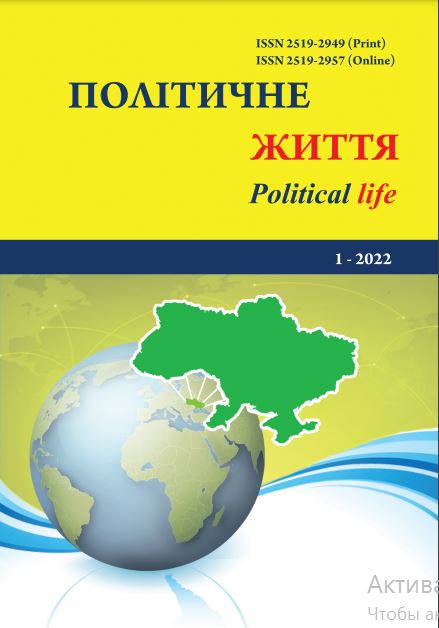Georgia’s foreign policy under the new balance of power in the South Caucasus after the Second Karabakh war
DOI:
https://doi.org/10.31558/2519-2949.2022.1.18Keywords:
South Caucasus; foreign policy; Georgia; European and Euro-Atlantic integration; Second Karabakh war; 3 3 PlatformAbstract
The article examines the specific features of Georgia’s foreign policy in the South Caucasus. The key interests that shape the foreign policy orientation of Tbilisi (European and Euro-Atlantic integration; liberation of the occupied territories; use of the state’s transit potential) are determined. The article analyzes the position of Georgia in relation to the current regional initiatives, which form the agenda of the South Caucasian politics after the events of the Second Karabakh War. The readiness of Georgia to play the role of a mediator in the peace process between Armenia and Azerbaijan is emphasized – however, at the same time, the limited potential of Tbilisi in this matter is pointed out. Concerns from some of the Georgian experts about the prospects of unblocking the Armenian-Azerbaijani border are describes, as such scenario may deprive Georgia of its exclusive role as a transit hub. The impossibility of Georgia’s participation in the work of multilateral regional formats, which include the Russian Federation, is explained. Also, the influence of the internal political factor on the foreign policy of Tbilisi is considered in the article. Aggravation of the confrontation between the authorities (“Georgian Dream”) and the opposition (“United National Movement”) exacerbates the situation, threatening the interests of the state. At the same time, the critical approach of certain Western experts to assessing the activities of the Georgian authorities is noted, as they see signs of a deliberate undermining of the pro-Western course from Tbilisi. These fears do not affect the immutability of European and EuroAtlantic integration, which is being implemented by Georgia. No alternative for such course is determined by public opinion, which demonstrates an extremely high level of support for the idea of membership in the EU and NATO. However, a clear pro-Western orientation at the same time limits Tbilisi’s regional potential. In fact, it is difficult for Georgia to find its place in the region in the context of an intensified competition for influence between the Russian Federation and Turkey, as well as under the conditions of decrease of Western influence in the South Caucasus
References
Ajvazjan A. Gruzija: vneshnjaja politika malogo gosudarstva. Sovremennaja Evropa. 2020. № 1. С. 80-90. DOI: http://dx.doi.org/10.15211/soveurope120208090
Vasadze G. Gruzija i novaja sistema bezopasnosti v Vostochnoj Evrope i na Blizhnem Vostoke. CACDS. 11.07.2021. URL: https://cacds.org.ua/?p=10764 (Last accessed: 25.08.2021).
David Zalkaliani: kavkazskuju iniciativu prezidenta nepravil’no ponjali. SovaNews, 24.12.2020. URL: https://sova.news/2020/12/24/david-zalkaliani-kavkazskuyu-initsiativu-prezidenta-nepravilno-ponyali/ (Last accessed: 10.10.2021).
Zamikula M. “Mriya” do prezy`dentstva dovede. Dzerkalo Ty`zhnya. 2018. № 46.
Poterjali granicy. Kak gruzinskie svjatyni okazalis’ na territorii Azerbajdzhana iz-za oshibok v sovetskih kartah. Lenta.ru, 04.04.2021. URL: https://lenta.ru/articles/2021/04/04/maps/ (Last accessed: 10.12.2021).
Unanjanc V. “Kavkazskie platformy” Zurabishvili i Jerdogana. Jeho Kavkaza, 23.12.2020. URL: https://www.ekhokavkaza.com/a/31015857.html (Last accessed: 11.10.2021).
Unanjanc V. 100 dnej Mishelja, ili Polnyj nazad “Mechty”. Jeho Kavkaza, 28.07.2020. URL: https://www.ekhokavkaza.com/a/31382528.html (Last accessed: 12.12.2021).
Anjaparidze Z. The Second Karabakh War and Georgia’s Threatened Transit Role. Eurasia Daily Monitor. 2021. Vol. 18 Issue 26. URL: https://jamestown.org/program/the-second-karabakh-war-and-georgias-threatened-transit-role/ (Last accessed:11.12.2021).
Bağırov O. Zəngəzur Koridorunun Açilmasinin Regional Nəqliyyat-Kommunikasiya Xətlərinə Təsiri [Impact of Zangazur Corridor Opening on Regional Transport and Communication Lines”]. AIR Center Paper, August 2021.
CEC Summarizes Final Vote Tally for October 31 Parliamentary Elections. URL: https://civil.ge/archives/385503 (Last accessed: 03.12.2021).
Gegeshidze A., De Waal T., Divided Georgia: A Hostage to Polarization. Carnegie Europe Paper, 08.12.2021. URL: https://carnegieeurope.eu/2021/12/08/divided-georgia-hostage-to-polarization-pub-85937 (Last accessed: 12.12.2021).
Georgian Ruling Party Wins Local Vote as Opposition Cries Foul. Bloomberg, 31.10.2021. URL: https://www.bloomberg.com/news/articles/2021-10-31/georgian-ruling-party-wins-local-vote-as-oppositioncries-foul (Last accessed: 03.12.2021).
Hodges B. The curtain could fall on Belarus, but Georgia may take its place. The Hill, 25.08.2020. URL: https://thehill.com/opinion/international/513432-the-curtain-could-fall-on-belarus-but-georgia-may-take-its-place (Last accessed: 29.08.2021).
Kelly I., Kramer D. J. Georgia Turns Its Back on the West. Foreign Policy, 20.08.2021. URL: https://foreignpolicy.com/2021/08/20/georgia-russia-belarus-putin-turns-back-on-west/ (Last accessed: 29.08.2021).
PM: We Offer Mediation to Azerbaijani and Armenian. Georgia Today, 27.09.2021. URL: https://georgiatoday.ge/pm-we-offer-mediation-to-azerbaijani-and-armenian/ (Last accessed: 15.10.2021).
Public Attitudes in Georgia. Results of December 2020 telephone survey сarried out for NDI by CRRC Georgia. URL: https://www.ndi.org/sites/default/files/NDI%20Georgia_December%202020%20Poll_ENG_FINAL.pdf (Last accessed: 04.09.2021).
Report on the Elections of the Parliament of Georgia 2012. URL: https://cesko.ge/static/res/old/other/13/13973.pdf (Last accessed: 03.12.2021).
Summary Protocol of the Central Election Commission of Georgia on the Final Results of 8 October 2016 Parliamentary Elections of Georgia. URL: https://cesko.ge/static/res/docs/shemajamebelieng.pdf (Last accessed: 03.12.2021).

